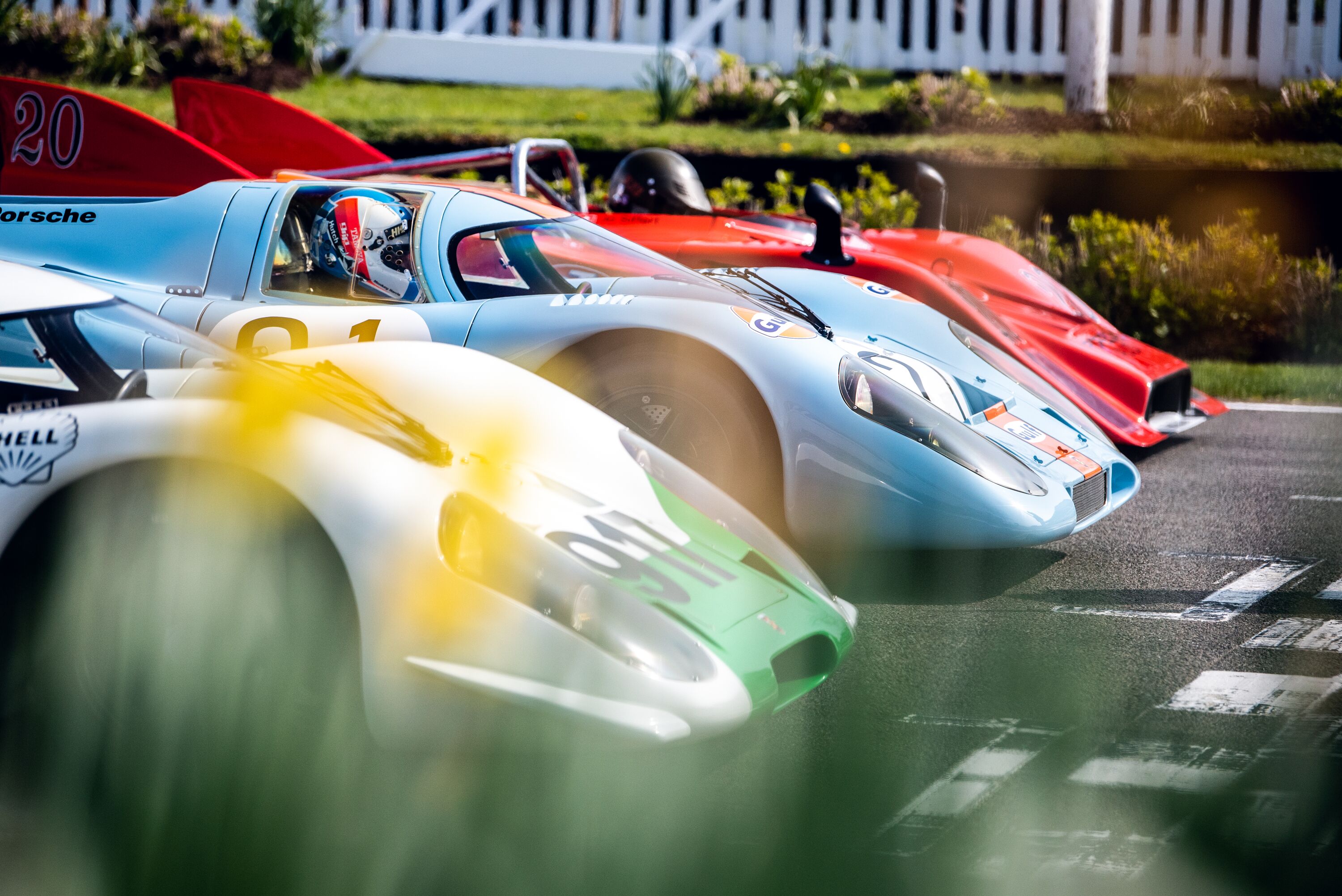How Revival era tech informs the stars of FOS Future Lab
The Revival whisks us back to the golden age of motor racing at the Goodwood Motor Circuit, an event that stages not only the world’s greatest historical racing, but also offers a retrospective look at the tech and innovations of that time.
When surrounded by classic cars, detailed vintage fashions and a prominent Revive & Thrive ethos, it becomes clear that the post-war boom era was every bit as groundbreaking as our current technological renaissance.

The jet engines, early computers and advanced materials that seemed impossibly futuristic in the 1950s were the forefathers of today's AI-powered vehicles, hydrogen fuel cells and advanced composites seen at FOS Future Lab presented by Randox.
Dawn of the Jet Age (1948-49)
The late 1940s marked the beginning of unprecedented technological advances. The de Havilland Comet, which first took flight in 1949, was a regular at the Goodwood Aerodrome and transformed civilian aviation by bringing jet propulsion to commercial travel.
This breakthrough didn't just change air travel — it inspired automotive designers to dream of jet-powered road cars and aerodynamic principles that would define classic car design for decades.
Perhaps more significantly for modern automotive technology, Bell Labs' invention of the transistor in 1948 laid the foundation for electronics that now powers everything from engine management systems to AI. Without this tiny component, the connected, intelligent vehicles of today would remain science fiction.

The Nuclear Dream (1950s)
The 1950s represented the height of atomic age optimism, with nuclear power promising unlimited clean energy. When Calder Hall, Britain's first commercial nuclear power station, began operations in 1956, it captured the public imagination so thoroughly that Ford designers created the Nucleon concept car in 1958 — a vehicle theoretically powered by a small nuclear reactor.
While nuclear-powered cars have never materialised, this era's bold thinking about alternative energy sources directly parallels today's hydrogen fuel cell technology and electric vehicles.
The decade also witnessed the birth of modern computing. The Ferranti Pegasus, unveiled in 1956, and IBM's 704 computer from 1954 introduced digital processing to engineering and automotive design.
These room-sized machines, with less computing power than a modern smartphone, nonetheless pioneered the computer-aided design principles that now create every component of contemporary racing cars and road vehicles.
Meanwhile, synthetic materials transformed automotive manufacturing. The development of polyester in 1953 and advanced plastics revolutionised car interiors and aerodynamics, introducing lightweight, durable materials that remain fundamental to modern automotive construction.

The Space Race (1960s)
Beginning with President Kennedy's 1961 Moon landing pledge, the Space Race drove significant innovation in lightweight materials, precision engineering and guidance systems.
Technologies developed for the Apollo programme, including carbon fibre composites and miniaturised electronics, would eventually become standard in high-performance vehicles and Formula 1, beginning with the groundbreaking McLaren MP4/1.
Perhaps most remarkable was General Motors' Electrovair programme, which produced the Electrovair I in 1964 and Electrovair II in 1966. These experimental electric vehicles, based on the Chevrolet Corvair, achieved modest ranges but demonstrated that electric propulsion could work in production vehicles.
Today's most thrilling electric vehicles, such as the Porsche Taycan, owe their existence to these pioneering efforts.
The launch of Telstar in 1962 created the first global satellite communication network, inspiring visions of connected vehicles that could communicate with infrastructure and other cars — concepts now realised in modern vehicle-to-vehicle communication systems and autonomous driving technology.
Simultaneously, automotive construction evolved dramatically with the monocoque chassis design becoming mainstream. The Lotus Elite (1957) and BMC Mini (1959) demonstrated how aerospace-inspired unibody construction could create lighter, stronger, more efficient vehicles — principles that remain central today.

The Future Lab connection
With FOS Future Lab spotlighting themes of future mobility, new powertrains, space exploration, AI and advanced materials, several connections to the pioneering Revival era can be made.
The nuclear optimism of the 1950s has evolved into today's clean energy revolution, while the room-sized computers of the Ferranti age have become the AI systems that can now pilot vehicles autonomously.
The electric vehicle experiments of the 1960s have matured into the sophisticated EVs that increasingly dominate racing and road car development. The space programme's lightweight materials research continues with today's British aerospace trailblazers.
Most importantly, the hopefulness and willingness to imagine radical alternatives that characterised the Revival era remain alive in today's automotive innovation.Just as engineers in 1958 could seriously propose nuclear-powered family cars, today's developers pursue equally ambitious goals: fully autonomous vehicles, hydrogen-powered racing cars, and AI systems to optimise every aspect of automotive performance.

The Revival Experience
The genius of the Goodwood Revival lies not just in its faithful recreation of the 1948-‘66 period, but in its recognition that the innovative spirit of this time remains deeply relevant. It demonstrates how the technological audacity of the post-war boom became a major inspiration for what continues to drive automotive — and human— progress today.
Visitors can witness period-correct Jaguar D-types and Aston Martin DB3s competing on track, then explore how their design principles evolved into modern Le Mans prototypes. They can admire the Space-Age styling of a 1960s Ford GT40, then learn how its aerodynamic lessons inform contemporary hypercar development.
This connection between past and future makes the Revival more than a nostalgia trip, it’s a celebration of continuous innovation, showing how the automotive industry's greatest achievements have been built upon the bold thinking of previous generations.
Randox is a global leader in diagnostics, revolutionising patient outcomes through innovative technologies, including its patented biochip technology. This pioneering diagnostic platform allows for the simultaneous detection of multiple biomarkers from a single sample, delivering faster, more accurate, and comprehensive results. Operating in over 145 countries, Randox develops advanced laboratory instruments, high-quality reagents, and innovative testing solutions to improve global healthcare.
Randox Health brings this cutting-edge technology directly to individuals, offering bespoke, preventative health testing programs. With world-class laboratories and personalised health insights, Randox Health enables early detection of a wide range of conditions, helping individuals take control of their health.
Together, Randox and Randox Health are redefining diagnostics and preventative healthcare. For more information, visit www.randox.com and www.randoxhealth.com.
Tickets for the Goodwood Revival are limited! Only Sunday tickets remain, so secure yours now to avoid missing out on the world's best historic motorsport event.
Main image photography by Jayson Fong.
festival of speed
fos
revival
event coverage
future lab
fos future lab









